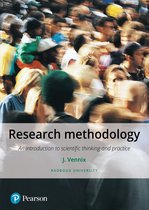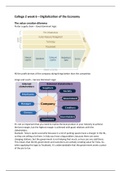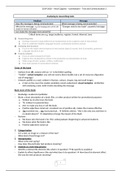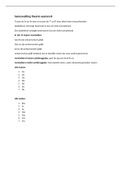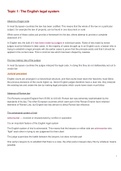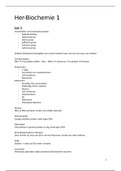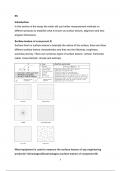1. The origins of science
Until the 19th century scientific activities were classified under two headings:
- Natural philosophy (science of nature).
- Natural history (study of organisms).
In the Anglo-Saxon world the word science refers to the ‘hard’ or natural sciences, i.e.
physics, chemistry, astronomy, engineering, etc. (in terms of education they are often
denoted as STEM; science, technology, engineering, and mathematics studies). These are
also called beta-sciences. Other disciplines are often referred to as social sciences (e.g.
political science, economics, sociology), which may or may not include behavioural
sciences (e.g. psychology), and humanities (philosophy, languages, history).
Management Science is also known as Operational Research (UK) or Operations Research
(USA). Management Science is the discipline of using scientific research-based principles,
strategies, and other analytical methods, such as mathematical modelling to improve any
organization’s ability to enact rational, meaningful business management decisions.
1.1 Learning and knowing in everyday life and in science
Thomas Merton mentions the following regarding controversies in scientific discussions:
‘these controversies follow the classically identified course of social conflict. Attack is
followed by counterattack, with progressive alienation of each party to the conflict. Since
the conflict is public, it becomes a battle for status more nearly than a research for truth.
Selective perception: is the process by which individuals perceive what they want to in
media messages while ignoring opposing viewpoints. It is a broad term to identify the
behaviour all people exhibit to tend to ‘see things’ based on their particular frame of
reference.
Confirmation bias: the selective collection of evidence that supports one’s point of view
and discarding information which could refute one’s opinion. More specifically,
information that is contrary to our beliefs is scrutinized more critically than information
which is consistent with our beliefs.
Self-fulfilling prophecies: a situation in which my expectation leads me to behave in such
a way that my expectation actually becomes reality.
Science is a cumulative effort, i.e. scientists/researchers build on each other’s work. Not
only by adding knowledge, but also by critically examining what is known and sometimes
outright reject the then current body of knowledge and replace It with something better.
Progress in research can be very powerfully halted by preconceived ideas, assumptions
that are either tacit (stilzwijgend) (and thus not noticed) or considered so normal that
most people would not even consider to question them.
The scientific method: ‘study of the history and philosophy of science can be strongly
recommended, but for a different reason: because of the contributions they can make to
one’s understanding of modern Western civilization. Science is one of the most
distinctive, and perhaps the most significant feature of our contemporary culture. This is
not only because of the substantive findings of scientists and their practical applications
but, more importantly, because of the development of the ‘scientific way of thinking’,
which has spread, though not without continuing resistance, beyond the domain of
science into all aspects of our lives’.
,1.1.1 Typical characteristics of philosophers and scientists
Characteristics:
- Curiosity, i.e. the desire to understand the phenomena that we perceive around us
(not a sufficient condition).
- Scepticism (coming up with new knowledge).
- Perseverance.
- Way of thinking (superior critical, independent thinking skills, able to make the
necessary distinctions and produce arguments in a coherent and cognitive (not
emotional) matter).
- Creativity (to come up with something new, something which did not exist so far,
and that can also concern new ideas, e.g. a hypothesis).
1.2 Ancient Greece as the cradle of western science
1.2.1 Plato and Aristotle
Acquiring knowledge
- According to Plato, the a-priori thinker: ‘… who tries to fit Nature to a
preconceived intellectual scheme’ (a-priori refers to reasoning about certain
phenomena before or without using sensory perception as the basis of
knowledge).
- Aristotle: ‘… who constructs his intellectual scheme to fit what is observed in
Nature’.
Plato points out: ‘if anyone attempts to learn anything which is perceivable – his open
mouth may yawn upwards or his closed mouth purse downwards, it makes no difference.
He, I declare, will never learn. For such things do not admit of knowledge. Astronomy,
then, like geometry, we shall pursue by the help of problems, and leave the starry
heavens alone; if we hope truly to apprehend it, and turn the natural intelligence of the
soul from useless to use’.
1.2.2 Ptolemy’s model of the universe
1.3 Why the Greek civilisation?
One question, which may arise is why we see the ancient Greeks as the first scientists. In
his book, philosopher sir Karl Popper’s answer is that together with expressing
explanations about ‘the world’, the ancient Greeks introduced a tradition of critique. They
did not just adopt these explanations, but discussed them critically. They introduced a
tradition with a ‘… critical or argumentative attitude’. Lloyd notes that the Greeks were
much more adversarial (and polemic) in the scientific enterprise than were the Chinese.
Lloyd conjectures that one of the reasons why some philosophers, certainly Plato and
partly also Aristotle demanded demonstration (proof) as a way to get to certain
knowledge was in fact: ‘… to distance themselves from those who they generally
considered to be no more than mere opportunistic purveyors of the plausible’. In that
sense Plato made a distinction between opinion (knowledge gained through the senses)
and knowledge (gained through pure reasoning).
2. The scientific method
There are two types of knowledge:
- Knowing ‘what is the case’ (or ‘that something is the case’).
- Knowing why this is the case.
,2.1 Deduction, induction, and abduction
2.1.1 Deduction
There are two forms of deduction:
- As a form of argument (deductive logic).
- As a form of science (deductive science).
Deductive logic
Deductive logic works from the universal (or general) towards the individual (or specific).
The most famous example of a deductive argument is the so-called syllogism, as
developed by Aristotle. It’s a form of argument which consists of two premises (P) and
one conclusion (C). For example:
- All humans are mortal (P1).
- X is a human (P2).
- X is mortal (C).
In a syllogism the conclusions follow by necessity from the premises. If the premises are
true (i.e. correspond to a state of affairs in reality) then the conclusion must also be true.
That is the strength of the syllogism. The critiques regarding the syllogism are based on
the fact that the conclusions of a syllogistic argument are in fact ‘in-cluded’ in the
premises.
In addition, you have to keep in mind that (formal) logic is a branch of philosophy and as
such is not concerned with the truth of premises and conclusions, it focusses primarily on
the question whether a particular argument is valid or not, i.e. whether the conclusions
follow logically from the premises.
The following is an example of a valid argument. The conclusion, however, is not true
(based on what we observe in reality):
- All dogs have five legs (P1).
- X is a dog (P2).
- X has five legs (C).
Another form of argument is the ‘material implication’. It has the following conditional
form: ‘p implies q’, or, stated differently ‘if p then q’ (in formal notation (p -> q)). There
are four situations possible:
- If P then Q; P holds; therefore Q.
- If P then Q; not P; therefore not Q.
- If P then Q; Q; therefore P.
- If P then Q; not Q; therefore not P.
This type of argument is frequently invoked when testing hypotheses in empirical
research.
Deductive science
Deductive sciences do not take empirical phenomena as their point of departure, but
rather start from particular axioms (or postulates), which are considered more or less
evident: they do not need a certain proof to be accepted as true.
Axiomatic-deductive science: needs only definitions of concepts and axioms as primitive
postulates.
2.1.2 Induction
, There are two forms of induction:
- As a form of argument (inductive logic).
- As a form of science (inductive science).
Inductive logic
In methodological terms referred to as going from the specific to the general, from
observing a set of empirical phenomena to a general statement.
Complete induction takes the following form:
- All x have been studies.
- All studies x have characteristics y.
- Conclusion: all x have characteristic y.
It does not contain much new insight.
Incomplete induction takes the following form:
- I have seen a number of trees.
- All those trees have green leaves.
- Conclusion: all trees have green leaves.
In this case we make a kind of leap from a limited number of observations or ‘cases’, to a
more general (or: universal) statement, which includes cases which I have not observed
(including past and future ones). In that sense, new knowledge is added, but the
downside is that we cannot be sure that the conclusion is true.
In a more formal way one could say that the inductive strategy of knowledge acquisition
consists of the following steps (Blaikie, 1993):
- All facts are observed and recorded without selection or guesses as to their
relative importance.
- These facts are analysed, compared and classified, without using hypotheses.
- From this analysis, generalisations are inductively drawn as to the relations
between them.
- These generalisations are subjected to further testing.
Inductive sciences
All sciences, which take empirical reality, i.e. empirical phenomena as they appear to us,
as their point of departure, are inductive sciences. While a deductive science relies very
heavily on logic and argument to build the body of knowledge from the axioms, inductive
sciences rely heavily on observation of empirical phenomena. The whole idea is that
through observation of particular empirical phenomena, one tries to find regularities, or
recurring patters, e.g. the sequence of day and night, or of the seasons.
Induction, as a method to arrive at certain knowledge, has several problems.
- The induction problem.
- The frank or unprejudiced observation (human observation is influenced in all
sorts of (unconscious) ways).
- The misunderstanding that through induction hypotheses to explain the
phenomena will more or less automatically surface.
2.1.3 Abduction
Abduction: creating a hypothesis (conjecture) which can explain an empirical
phenomenon. It is also known as ‘the method of hypothesis’ of ‘inference to the best
explanation’.
Until the 19th century scientific activities were classified under two headings:
- Natural philosophy (science of nature).
- Natural history (study of organisms).
In the Anglo-Saxon world the word science refers to the ‘hard’ or natural sciences, i.e.
physics, chemistry, astronomy, engineering, etc. (in terms of education they are often
denoted as STEM; science, technology, engineering, and mathematics studies). These are
also called beta-sciences. Other disciplines are often referred to as social sciences (e.g.
political science, economics, sociology), which may or may not include behavioural
sciences (e.g. psychology), and humanities (philosophy, languages, history).
Management Science is also known as Operational Research (UK) or Operations Research
(USA). Management Science is the discipline of using scientific research-based principles,
strategies, and other analytical methods, such as mathematical modelling to improve any
organization’s ability to enact rational, meaningful business management decisions.
1.1 Learning and knowing in everyday life and in science
Thomas Merton mentions the following regarding controversies in scientific discussions:
‘these controversies follow the classically identified course of social conflict. Attack is
followed by counterattack, with progressive alienation of each party to the conflict. Since
the conflict is public, it becomes a battle for status more nearly than a research for truth.
Selective perception: is the process by which individuals perceive what they want to in
media messages while ignoring opposing viewpoints. It is a broad term to identify the
behaviour all people exhibit to tend to ‘see things’ based on their particular frame of
reference.
Confirmation bias: the selective collection of evidence that supports one’s point of view
and discarding information which could refute one’s opinion. More specifically,
information that is contrary to our beliefs is scrutinized more critically than information
which is consistent with our beliefs.
Self-fulfilling prophecies: a situation in which my expectation leads me to behave in such
a way that my expectation actually becomes reality.
Science is a cumulative effort, i.e. scientists/researchers build on each other’s work. Not
only by adding knowledge, but also by critically examining what is known and sometimes
outright reject the then current body of knowledge and replace It with something better.
Progress in research can be very powerfully halted by preconceived ideas, assumptions
that are either tacit (stilzwijgend) (and thus not noticed) or considered so normal that
most people would not even consider to question them.
The scientific method: ‘study of the history and philosophy of science can be strongly
recommended, but for a different reason: because of the contributions they can make to
one’s understanding of modern Western civilization. Science is one of the most
distinctive, and perhaps the most significant feature of our contemporary culture. This is
not only because of the substantive findings of scientists and their practical applications
but, more importantly, because of the development of the ‘scientific way of thinking’,
which has spread, though not without continuing resistance, beyond the domain of
science into all aspects of our lives’.
,1.1.1 Typical characteristics of philosophers and scientists
Characteristics:
- Curiosity, i.e. the desire to understand the phenomena that we perceive around us
(not a sufficient condition).
- Scepticism (coming up with new knowledge).
- Perseverance.
- Way of thinking (superior critical, independent thinking skills, able to make the
necessary distinctions and produce arguments in a coherent and cognitive (not
emotional) matter).
- Creativity (to come up with something new, something which did not exist so far,
and that can also concern new ideas, e.g. a hypothesis).
1.2 Ancient Greece as the cradle of western science
1.2.1 Plato and Aristotle
Acquiring knowledge
- According to Plato, the a-priori thinker: ‘… who tries to fit Nature to a
preconceived intellectual scheme’ (a-priori refers to reasoning about certain
phenomena before or without using sensory perception as the basis of
knowledge).
- Aristotle: ‘… who constructs his intellectual scheme to fit what is observed in
Nature’.
Plato points out: ‘if anyone attempts to learn anything which is perceivable – his open
mouth may yawn upwards or his closed mouth purse downwards, it makes no difference.
He, I declare, will never learn. For such things do not admit of knowledge. Astronomy,
then, like geometry, we shall pursue by the help of problems, and leave the starry
heavens alone; if we hope truly to apprehend it, and turn the natural intelligence of the
soul from useless to use’.
1.2.2 Ptolemy’s model of the universe
1.3 Why the Greek civilisation?
One question, which may arise is why we see the ancient Greeks as the first scientists. In
his book, philosopher sir Karl Popper’s answer is that together with expressing
explanations about ‘the world’, the ancient Greeks introduced a tradition of critique. They
did not just adopt these explanations, but discussed them critically. They introduced a
tradition with a ‘… critical or argumentative attitude’. Lloyd notes that the Greeks were
much more adversarial (and polemic) in the scientific enterprise than were the Chinese.
Lloyd conjectures that one of the reasons why some philosophers, certainly Plato and
partly also Aristotle demanded demonstration (proof) as a way to get to certain
knowledge was in fact: ‘… to distance themselves from those who they generally
considered to be no more than mere opportunistic purveyors of the plausible’. In that
sense Plato made a distinction between opinion (knowledge gained through the senses)
and knowledge (gained through pure reasoning).
2. The scientific method
There are two types of knowledge:
- Knowing ‘what is the case’ (or ‘that something is the case’).
- Knowing why this is the case.
,2.1 Deduction, induction, and abduction
2.1.1 Deduction
There are two forms of deduction:
- As a form of argument (deductive logic).
- As a form of science (deductive science).
Deductive logic
Deductive logic works from the universal (or general) towards the individual (or specific).
The most famous example of a deductive argument is the so-called syllogism, as
developed by Aristotle. It’s a form of argument which consists of two premises (P) and
one conclusion (C). For example:
- All humans are mortal (P1).
- X is a human (P2).
- X is mortal (C).
In a syllogism the conclusions follow by necessity from the premises. If the premises are
true (i.e. correspond to a state of affairs in reality) then the conclusion must also be true.
That is the strength of the syllogism. The critiques regarding the syllogism are based on
the fact that the conclusions of a syllogistic argument are in fact ‘in-cluded’ in the
premises.
In addition, you have to keep in mind that (formal) logic is a branch of philosophy and as
such is not concerned with the truth of premises and conclusions, it focusses primarily on
the question whether a particular argument is valid or not, i.e. whether the conclusions
follow logically from the premises.
The following is an example of a valid argument. The conclusion, however, is not true
(based on what we observe in reality):
- All dogs have five legs (P1).
- X is a dog (P2).
- X has five legs (C).
Another form of argument is the ‘material implication’. It has the following conditional
form: ‘p implies q’, or, stated differently ‘if p then q’ (in formal notation (p -> q)). There
are four situations possible:
- If P then Q; P holds; therefore Q.
- If P then Q; not P; therefore not Q.
- If P then Q; Q; therefore P.
- If P then Q; not Q; therefore not P.
This type of argument is frequently invoked when testing hypotheses in empirical
research.
Deductive science
Deductive sciences do not take empirical phenomena as their point of departure, but
rather start from particular axioms (or postulates), which are considered more or less
evident: they do not need a certain proof to be accepted as true.
Axiomatic-deductive science: needs only definitions of concepts and axioms as primitive
postulates.
2.1.2 Induction
, There are two forms of induction:
- As a form of argument (inductive logic).
- As a form of science (inductive science).
Inductive logic
In methodological terms referred to as going from the specific to the general, from
observing a set of empirical phenomena to a general statement.
Complete induction takes the following form:
- All x have been studies.
- All studies x have characteristics y.
- Conclusion: all x have characteristic y.
It does not contain much new insight.
Incomplete induction takes the following form:
- I have seen a number of trees.
- All those trees have green leaves.
- Conclusion: all trees have green leaves.
In this case we make a kind of leap from a limited number of observations or ‘cases’, to a
more general (or: universal) statement, which includes cases which I have not observed
(including past and future ones). In that sense, new knowledge is added, but the
downside is that we cannot be sure that the conclusion is true.
In a more formal way one could say that the inductive strategy of knowledge acquisition
consists of the following steps (Blaikie, 1993):
- All facts are observed and recorded without selection or guesses as to their
relative importance.
- These facts are analysed, compared and classified, without using hypotheses.
- From this analysis, generalisations are inductively drawn as to the relations
between them.
- These generalisations are subjected to further testing.
Inductive sciences
All sciences, which take empirical reality, i.e. empirical phenomena as they appear to us,
as their point of departure, are inductive sciences. While a deductive science relies very
heavily on logic and argument to build the body of knowledge from the axioms, inductive
sciences rely heavily on observation of empirical phenomena. The whole idea is that
through observation of particular empirical phenomena, one tries to find regularities, or
recurring patters, e.g. the sequence of day and night, or of the seasons.
Induction, as a method to arrive at certain knowledge, has several problems.
- The induction problem.
- The frank or unprejudiced observation (human observation is influenced in all
sorts of (unconscious) ways).
- The misunderstanding that through induction hypotheses to explain the
phenomena will more or less automatically surface.
2.1.3 Abduction
Abduction: creating a hypothesis (conjecture) which can explain an empirical
phenomenon. It is also known as ‘the method of hypothesis’ of ‘inference to the best
explanation’.

